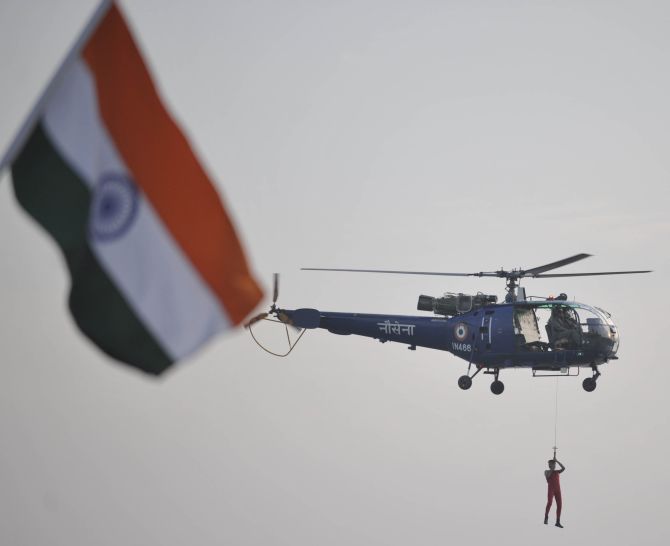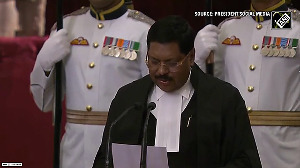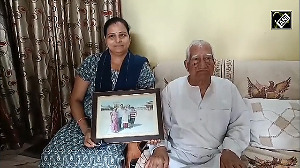'Those of us who have seen the Indian military from close quarters for decades now are outraged at Admiral Sushil Kumar's irresponsible and in my view flippant remark,' says Nitin A Gokhale.
'What makes people like Julio Riberio and Admiral Sushil Kumar, who rose to the highest positions in their respective professions, play the victim? Especially when it is not clear if all the attacks on Christians and Christian establishments had their roots in religious intolerance.'

This story dates back to the communally charged months in the run-up to the Ayodhya-Babri Masjid episode in 1992. The source of the information will have to remain unnamed although amyone with the knowledge of those days can easily guess the cast of characters.
The Cabinet Committee on Security was discussing the situation in Faizabad and the possibility of calling the Indian Army in. The CCS was divided on this point. So it was decided to summon the then army chief, a Christian.
As he faced the ministers and the question of sending the army in, the General politely but firmly declined to deploy the army.
Perhaps surprised and possibly angered by the General's direct refusal, a senior minister turned to the army chief and remarked: 'What's your problem? You are a Christian. The tension in Ayodhya is between Hindus and Muslims!'
Taken aback by the minister's cynicism, the General reportedly told the politician: 'I have Hindu, Muslim, Sikh, Christian troops and officers, but we have only one identity, that of the Indian Army soldier. Don't draw us into a situation that will dilute that identity!'
How the minister in question reacted to the rebuke from the General is not known, but we do know that the army was not deployed in Ayodhya in December 1992.
I have recounted this episode in some detail in the context of former navy chief Admiral Sushil Kumar's remark on Barkha Dutt's programme on Tuesday, March 31, and his subsequent defence of the statement on Wednesday.
Admiral Sushil Kumar, himself a practising Christian, had remarked, 'Fear among Christians can percolate to the armed forces,' during a discussion on the recent attacks on Christians and Christian establishments in India.
To me, the Admiral was not only overstating the point but was also hitting at the very foundation of the Indian armed forces. The fauj in India does not advertise secularism, but practises it every day.
In fact, those of us who have seen the Indian military from close quarters for decades now are outraged at Admiral Sushil Kumar's irresponsible and in my view flippant remark.
I have known the Admiral for over a decade and I must confess that he has been one of my 'go-to' navy chiefs whenever expert analysis on naval matters was needed. But on this one I am afraid, Admiral, you did a great disservice to the Indian military and I have to say so on a public platform since you made the remark on a television show.
What makes people like Julio Riberio and Admiral Sushil Kumar, who rose to the highest positions in their respective professions, play the victim? Especially when it is not clear if all the attacks on Christians and Christian establishments had their roots in religious intolerance.
We know that some of them were pure law and order issues and some were carried out by disgruntled elements. There are no clear answers, but I think the contrived media narrative about 'Christians under siege in India' is perhaps forcing otherwise sane personalities to fall back on their religious identity.
The Indian military is beset with many ills -- corruption, nepotism, lack of cohesion among its various arms, shortfall in officers and equipment -- but it is still -- and thank the Lord for small mercies -- free of the communal virus.
Let us keep it that way and not fall for a false argument that 'all-men-and-women-who-are-recruited-in-the-Indian-military-come-from-the-same-communally-divided-Indian-society-and-are-therefore-also-communal,' as some pundits seem to suggest.
Nitin A Gokhale is one of India's best known commentators on national security matters.
REDIFF RECOMMENDS
Image: Navy Day celebrations at the Gateway of India in Mumbai. Photograph: Sahil Salvi











